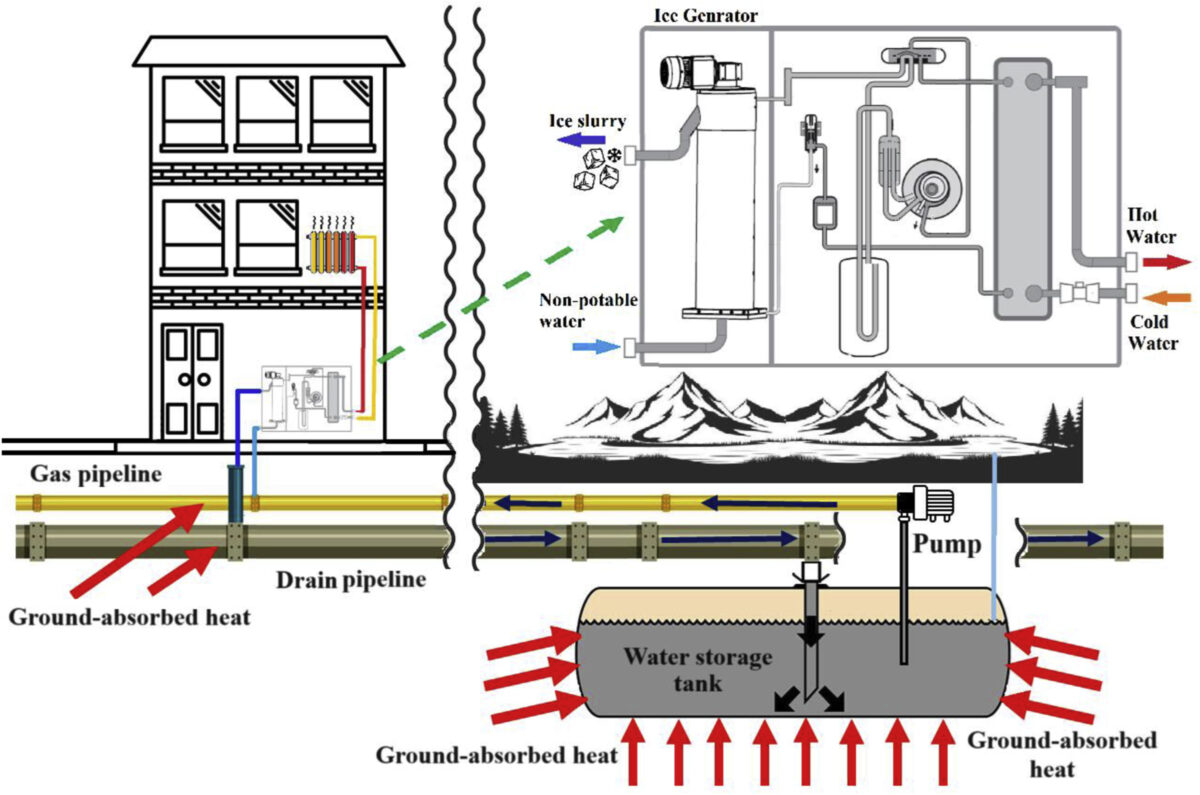Researchers from the University of Nottingham in the United Kingdom have developed a residential ice-source heat pump system that uses repurposing existing gas pipelines to transport water for the ice-source heat pump's operation.
“Our heat pump demonstrates superior performance compared to all existing types, based on our claims. We have developed a prototype and are about to begin testing its performance,” corresponding author, Ramin Mehdipour, told pv magazine.
The research group carried out a numerical simulation of the system on a house with a 98 m2 floor area, operating in the weather of the British city of Nottingham in 2021.
“The biggest issue with air-source heat pumps (ASHPs) is their inability to provide adequate heating during peak cold conditions, leading to higher electricity consumption and potential strain on the energy supply system,” the academics said. “Innovative solutions are vital for overcoming challenges in the heating sector, and ice-source heat pumps, by repurposing gas pipelines, offer a promising alternative that balances technological feasibility with environmental sustainability.”
Ice-source heat pumps are based on utilizing the latent heat produced when water freezes to ice. It cools the water until freezing with the R290 refrigerant and utilizes the released heat to warm the house. The ice slurry produced is then discharged into the drainage system or stored for cooling purposes in the summer.
The scientists also explained that ground temperatures during winter are higher than the external environment, which they said provides a stable heat source. “Our system aligns with geothermal heat pump principles and can be seen as a central heat pump system,” said Mehdipour. “While other heat pumps experience performance drops during peak cold conditions, the ice-source heat pump is specifically designed to operate in such conditions without disruption. Additionally, it significantly reduces ancillary energy needs for fluid circulation and water consumption, making it a suitable and efficient option.”
After designing the system, the team developed its governing equations based on thermodynamic principles and heat transfer. As references, it compared the systems to heat pumps with another heat source. They were, namely, heated by air, ground, lake and river water, pipe water, and wastewater.
The analysis showed that the heat pump's operating temperature aligns with that of systems using water near freezing. Its coefficient of performance (COP) was found to be approximately 4.77.
“The system can reduce the water mass needed for energy supply by up to 95% when using a 70% ice slurry concentration,” the scientists said. “In practical terms, the ice-source heat pump requires approximately 36.7 times less water volume than traditional heating systems for residential use, making it a highly efficient alternative.”
In concluding the research, they also said that although other heat pumps may perform better in seasons with moderate temperatures, they may also have “significant” performance decreases at low temperatures, particularly during peak cold periods.
Their findings were presented in “A comparative study on the performance of ice-source heat pumps versus other heat source heat pumps: A case study in the UK,” published in Renewable Energy.
This content is protected by copyright and may not be reused. If you want to cooperate with us and would like to reuse some of our content, please contact: editors@pv-magazine.com.



By submitting this form you agree to pv magazine using your data for the purposes of publishing your comment.
Your personal data will only be disclosed or otherwise transmitted to third parties for the purposes of spam filtering or if this is necessary for technical maintenance of the website. Any other transfer to third parties will not take place unless this is justified on the basis of applicable data protection regulations or if pv magazine is legally obliged to do so.
You may revoke this consent at any time with effect for the future, in which case your personal data will be deleted immediately. Otherwise, your data will be deleted if pv magazine has processed your request or the purpose of data storage is fulfilled.
Further information on data privacy can be found in our Data Protection Policy.